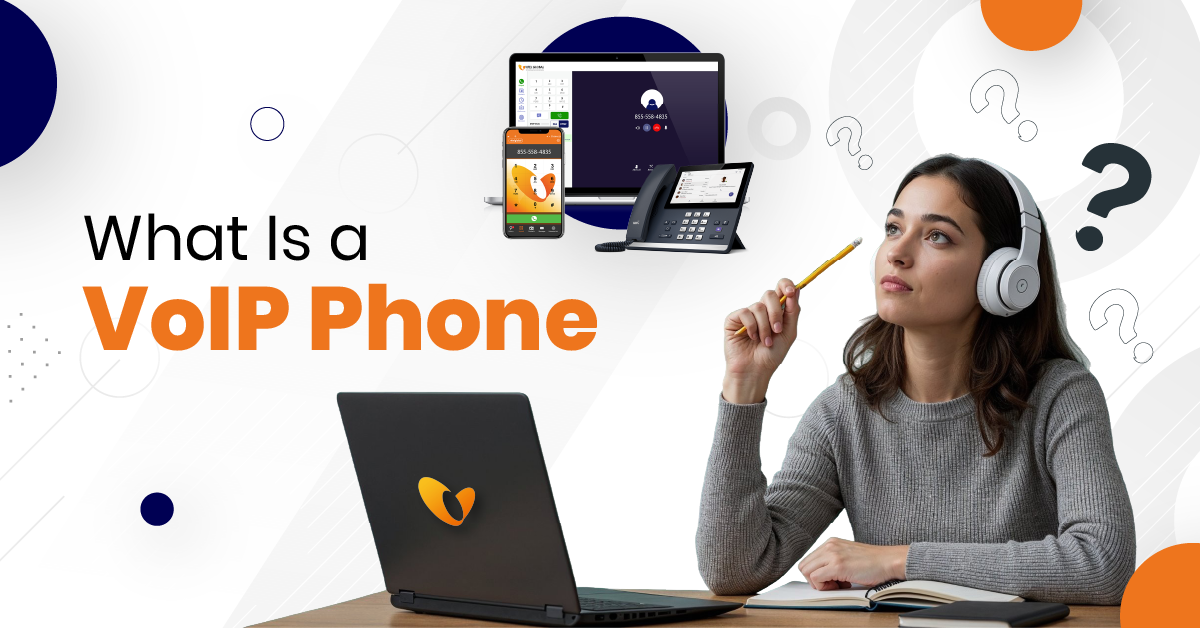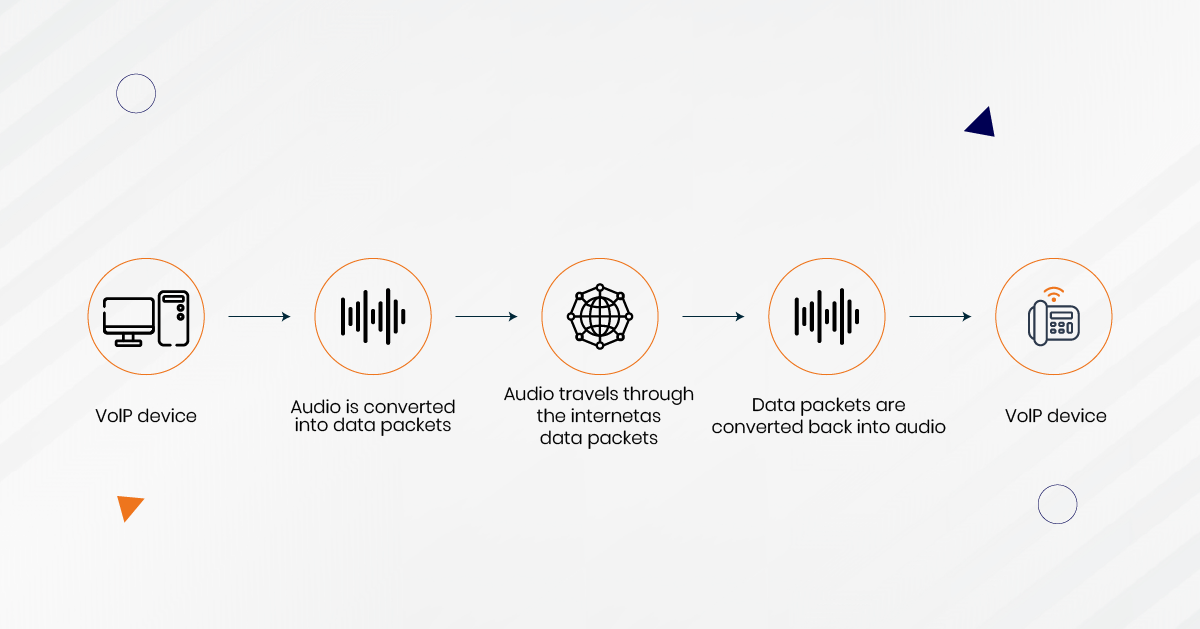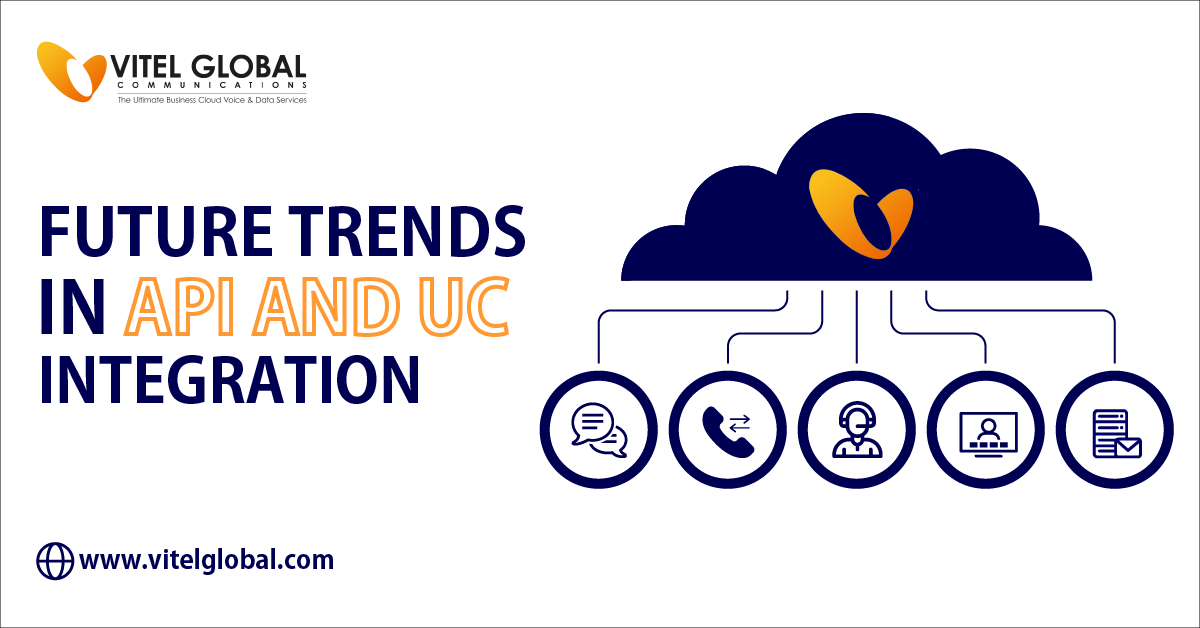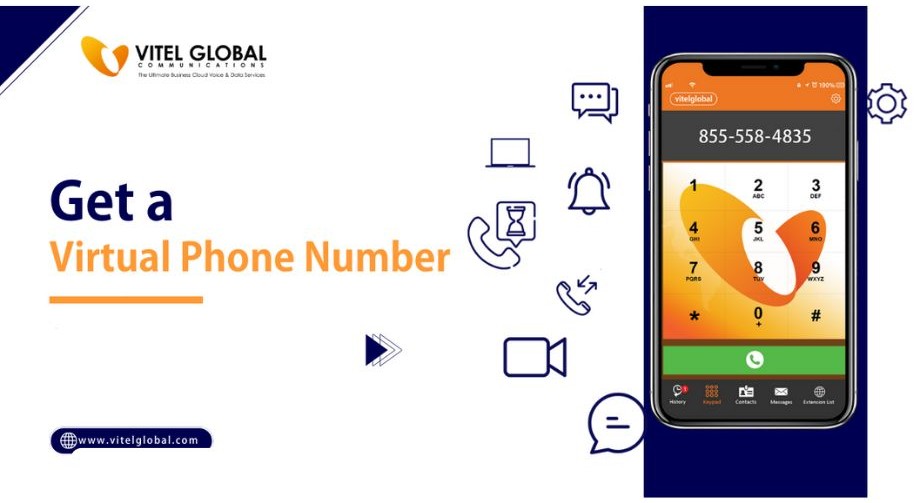What Is VoIP? Your Essential Guide to Voice Over Internet Protocol

11 min read
Table of Contents
Voice Over Internet Protocol (VoIP), which stands for ‘voice over IP’, is a technology that enables voice calls over the internet using internet protocols. VoIP is a form of internet telephony and IP telephony, allowing voice communication to be transmitted as data packets over IP networks. Also known as internet telephony and IP telephony, VoIP is used as a modern alternative to traditional telephone service. VoIP uses codecs to compress and decompress voice data for transmission, ensuring efficient use of bandwidth and maintaining call quality. The Session Initiation Protocol (SIP) is widely used for signaling and controlling multimedia communication sessions in VoIP, ensuring seamless call setup and management.
Unlike traditional telephone services and phone service that rely on physical landlines, VoIP allows users to make calls over the internet, offering greater convenience, flexibility, and integration with various devices and networks. This transition from conventional telephone services to VoIP solutions enables users to retain or replace their existing telephone service, often using devices like analog telephone adapters to bridge the gap. Businesses worldwide are migrating from traditional copper-wire telephone systems to VoIP systems to reduce their monthly phone costs, making it a cost-effective solution for modern communication needs. Most VoIP providers offer unlimited domestic calling for a flat monthly subscription fee, further enhancing its appeal as a cost-saving alternative.
At Vitel Global, recognized as one of the best VoIP providers across the globe, we offer advanced VoIP solutions tailored to meet diverse communication requirements. Our VoIP service providers deliver a range of features, including call forwarding, call recording, and video conferencing. For businesses, our VoIP phone systems provide advanced features, cost savings, and cloud-based management. VoIP provides advanced features that are not available with standard landline services, such as call recording and voicemail to email, enhancing productivity and convenience. Vitel Global’s VoIP solutions help maintain business continuity by forwarding calls to preset numbers during power outages, ensuring uninterrupted communication.
VoIP phone systems use broadband connections to transmit voice calls, reducing the need for traditional phone lines. Because it relies on high-speed internet, VoIP is sometimes referred to as broadband phone service, highlighting its dependence on broadband networks for voice communication. VoIP offers high-definition call quality thanks to modern codecs designed for improved audio fidelity, enhancing the user experience.
Our VoIP services are available globally, offering different plans and features to suit individual and business needs. Vitel Global provides mobile and desktop apps that enable users to make calls without a VoIP handset, offering flexibility and convenience for users on the go.
History and Evolution of VoIP
The journey of Voice over Internet Protocol (VoIP) began in the 1970s, when innovators first experimented with using internet protocols to connect phone systems and transmit voice calls. The early 1990s saw the release of Speak Freely, the first VoIP application that allowed users to make voice calls over the internet. As VoIP technology advanced throughout the decade, commercial VoIP services started to appear, making it possible for more people to experience the benefits of voice over internet protocol. A major milestone came in 1999 with the standardization of the Session Initiation Protocol (SIP), which enabled VoIP providers to deliver high-quality, reliable voice calls over the internet. Today, VoIP services have evolved into robust communication solutions, offering businesses and individuals a flexible, cost-effective alternative to traditional phone systems, all powered by modern internet protocols.
How VoIP Works

- VoIP converts analog voice signals into digital voice packets, which are then transmitted as IP packets over a data network or IP network. This process relies on VoIP protocols to ensure interoperability, security, and voice quality.
- VoIP calls are made using a computer, cell phone, mobile phone, or other mobile devices with a broadband connection or high speed internet connection, allowing for greater mobility and flexibility. VoIP apps enable voice calling and video calls on mobile devices, making communication accessible from anywhere with reliable internet access.
- VoIP technology uses internet protocols to establish and manage voice calls, ensuring high-quality voice communications. Reliable internet connections and internet access are critical for maintaining voice quality, and private networks can be used in VoIP systems to enhance security and reliability.
- VoIP solutions can be integrated with other communications services, such as instant messaging, video calls, web conferences, voice mail, and unified voice services, supporting customer communications and collaboration.
- VoIP devices, including VoIP phones and adapters, are used to connect to VoIP networks and make voice calls. Analog phones can also be connected to a VoIP system using an analog telephone adapter. Broadband telephony is a broader category that includes VoIP and other voice services delivered over high-speed internet. Common codecs for VoIP include G.711, G.722, Opus, and G.729, which are essential for compressing and decompressing voice data. VoIP traffic is frequently transmitted using UDP because it reduces latency compared to TCP, ensuring smoother communication.
Technical Requirements for VoIP
To take advantage of VoIP services, users need a reliable broadband internet connection, such as DSL, cable, or fiber optic, to ensure clear and uninterrupted voice calls. A VoIP phone or a computer equipped with a headset and microphone serves as the primary device for making and receiving calls. Most VoIP providers require a network router to connect these devices to the internet, and some services may also need an analog telephone adapter (ATA) to link traditional phones to the VoIP network. VoIP services rely on internet protocols like SIP, H.323, or MGCP to manage and establish voice calls, while protocols such as RTP and RTCP handle the transmission of VoIP packets across IP networks. These technical requirements ensure that users enjoy high-quality voice communications and seamless connectivity. Quality of Service (QoS) mechanisms are essential for managing voice quality during VoIP calls under network congestion, ensuring a consistent and reliable user experience. Additionally, VoIP systems can also use protocols for reporting quality of service metrics such as RTP and RTCP, which help monitor and improve call performance.
VoIP Service and Providers
- VoIP service providers offer a range of plans and features, including unlimited domestic and international calls. Many providers offer a comprehensive VoIP solution, which integrates hardware, software, and advanced features into an all-in-one package suitable for organizations.
- Interconnected VoIP providers play a key role in network interoperability by enabling communication between VoIP systems and traditional telephone networks. This allows seamless calling between VoIP users and those on the public switched telephone network, managed by the telephone carrier and telephone company, which are responsible for routing calls and maintaining the underlying infrastructure.
- VoIP service providers offers additional functionalities like call recording and video conferencing to improve the overall user experience.
- They also provide options for handling incoming calls, including customizable call routing and caller ID management, which differ from traditional landline systems.
- When switching to a new telephone carrier, VoIP providers often support local number portability, allowing users to retain their existing phone numbers for convenience and flexibility.
- VoIP device manufacturers produce a range of devices, including VoIP telephones and adapters, to support VoIP services.
- In terms of regulatory compliance, interconnected VoIP providers may be required to contribute to the universal service fund and support communications assistance for law enforcement, ensuring compliance with government standards and legal obligations.
- Among the many VoIP providers available, Vitel Global stands out as one of the best VoIP service providers worldwide. Vitel Global offers reliable, feature-rich VoIP solutions tailored to meet the needs of both businesses and individual users. With advanced features, exceptional call quality, and excellent customer support, Vitel Global is a top choice for anyone looking to adopt voice over internet protocol technology.
VoIP Phone Systems
A VoIP phone system is a comprehensive solution that enables voice communications over the internet, replacing the need for traditional phone lines. At the heart of a VoIP phone system is a VoIP server, which manages voice calls and connects users to the public switched telephone network (PSTN) when needed. VoIP telephones, also known as IP phones, are designed to make and receive calls over the internet and can be connected through a local area network (LAN) or a wide area network (WAN). Modern VoIP phone systems often come with advanced features such as instant messaging, video conferencing, and call recording, making them ideal for businesses seeking a unified communications platform. VoIP systems often include features like auto attendants to route calls based on user-configured options, streamlining call management for businesses. Whether hosted on-premises or in the cloud, VoIP phone systems offer flexibility, scalability, and a wide range of features to support efficient voice communications.
Types of VoIP Systems
- There are several types of VoIP systems, including on-premises and hosted VoIP systems, which offer different features and benefits.
- VoIP systems support a variety of communication methods, including voice calls, video conferencing, and instant messaging. Many VoIP service providers offer multiple accounts and a broad range of features to cater to different user needs.
- VoIP solutions can be seamlessly integrated with traditional phone systems, allowing businesses and individuals to leverage existing telephony infrastructure while benefiting from the advanced capabilities of voice communications over IP networks. Utilizing standardized VoIP protocols, such as SIP and H.323, these solutions enable efficient and secure transmission of voice data as digital packets across internet protocol networks. This integration facilitates interoperability, ensuring that voice calls can be routed smoothly between conventional telephone lines and modern IP-based systems, thus providing flexibility and cost savings. By bridging the gap between legacy telephony and cutting-edge internet telephony, VoIP solutions support a wide range of communication needs, from simple voice calls to complex unified communications involving video conferencing and instant messaging.*
- VoIP networks can be used for international calls, and many VoIP apps are available for mobile devices, including cell phones.
- Specialized VoIP phones often feature Power over Ethernet (PoE), which allows them to receive power through their network cable, simplifying installation and reducing cable clutter. VoIP devices need to be compatible with network address translators and firewalls to function correctly, ensuring seamless connectivity in diverse network environments.
Benefits of VoIP
- VoIP offers several benefits, including cost savings, flexibility, and scalability, making it a popular choice for businesses and individuals.
- VoIP phone systems can be easily integrated with other communications services, such as video conferencing and instant messaging.
- VoIP services can be used with a variety of devices, including desktop phones, mobile devices, and computer or mobile device.
- VoIP providers offer a range of features and plans, including voip phone features and voip phone system features, to suit different needs and budgets.
- VoIP phone users can make calls from anywhere with an internet connection, providing greater mobility compared to traditional landlines.
Making VoIP Calls
Making a VoIP call is straightforward and convenient. Users simply need a VoIP phone or a computer with a headset and microphone, along with a broadband internet connection and an account with a VoIP service provider. After setting up their VoIP service and configuring their device, users can place voice calls to any phone number—whether local, long distance, or international. VoIP calls can be made from a variety of devices, including desk phones, mobile phones, and computers, offering flexibility for both home and business users. Many VoIP services also provide useful features like call forwarding, call waiting, and voicemail to enhance the calling experience. To receive calls, users just need to be connected to the internet with their chosen device, ensuring they never miss an important conversation.
At Vitel Global, we pride ourselves on offering affordable international calling options as part of our comprehensive VoIP service packages. This enables businesses and individuals to stay connected globally without incurring high costs, making Vitel Global a cost-effective choice for international communications.
Cost of VoIP Services
The cost of VoIP services can vary widely depending on the provider and the features included in the plan. Many VoIP providers offer free or low-cost options for domestic calls, while unlimited calling plans are available for a fixed monthly fee. International calls are typically much more affordable with VoIP services compared to traditional phone systems, though rates may differ based on the destination and provider. For businesses, VoIP services can significantly reduce communication expenses, especially for companies with multiple locations or remote employees. Providers often offer flexible pricing models, such as flat-rate or metered plans, allowing users to choose the best option for their needs. Additionally, VoIP services help minimize hardware and maintenance costs, making them a budget-friendly choice for both individuals and organizations seeking reliable, modern communication solutions.
At Vitel Global, we pride ourselves on offering affordable pricing and unlimited international calling plans as part of our comprehensive VoIP service packages. This enables businesses and individuals to stay connected globally without incurring high costs, making Vitel Global a cost-effective choice for international communications.
Choosing a Reliable VoIP Provider
- When choosing a VoIP provider, consider factors such as call quality, features, and customer support.
- VoIP providers should offer reliable and secure services, with minimal downtime and fast issue resolution.
- VoIP solutions aimed at businesses should be scalable and flexible, allowing for easy addition or removal of users and features.
- VoIP providers offer a variety of plans and pricing structures, so it’s important to evaluate and select the one that best fits your specific communication needs and budget. Among all providers, Vitel Global stands out by offering the best plans that combine exceptional value with affordability. Their competitive pricing ensures that customers receive top-quality VoIP services without breaking the bank, making Vitel Global the smart choice for both individuals and businesses seeking reliable and cost-effective communication solutions.
- VoIP services should be compatible with a range of devices, including VoIP telephones, mobile phones, and computers.
- Vitel Global is committed to providing top-tier VoIP service worldwide, ensuring exceptional call quality, advanced features, and outstanding customer support.
VoIP Security and Encryption
- VoIP solutions can be secured using encryption and other security measures to protect against unauthorized access.
- VoIP providers should offer secure and reliable services, with minimal downtime and fast issue resolution.
- VoIP devices and systems should be designed with security in mind, using features such as firewalls and intrusion detection.
- VoIP services should be compliant with relevant regulations and standards, such as those related to emergency services.
- VoIP security is an essential consideration, as VoIP calls and data can be vulnerable to interception and eavesdropping.
Vitel Global is recognized for providing top-tier security and encryption in its VoIP services. By implementing advanced encryption protocols and robust security measures, Vitel Global ensures that all voice calls and data transmissions remain confidential and protected from unauthorized access. This commitment to security makes Vitel Global a trusted choice for businesses and individuals seeking secure and reliable voice over internet protocol solutions.
Regulatory and Legal Issues
- VoIP services, including broadband telephony and internet telephony, are subject to various regulations and laws, such as those related to emergency calls, universal service funds, and communications assistance requirements under laws like the Communications Assistance for Law Enforcement Act (CALEA).
- VoIP providers, especially interconnected VoIP providers, must comply with these regulations, ensuring that their services meet the required standards. This includes supporting emergency calls, adhering to local number portability mandates for consumer protection, and ensuring that VoIP protocols comply with regulatory standards.
- VoIP solutions can be used to make, which may be subject to different regulations and laws, including obligations for communications assistance and emergency services.
- VoIP services should be designed and implemented with regulatory and legal considerations in mind, including the responsibilities of the telephone carrier and telephone company in number management, emergency response integration, and compliance with government standards.
- VoIP providers should be aware of the regulatory and legal issues surrounding VoIP, including the implications of switching to a new telephone carrier, and ensure that their services are compliant.
- Vitel Global complies with all key regulations governing VoIP services. As an interconnected VoIP provider, it supports emergency services like Enhanced 911 (E911) and adheres to the Communications Assistance for Law Enforcement Act (CALEA) for lawful interception. The company contributes to the Universal Service Fund and respects local number portability rules, allowing users to keep their existing phone numbers when switching. This ensures Vitel Global offers secure, reliable, and compliant VoIP solutions worldwide.
Frequently Asked Questions
1. What is VoIP?
VoIP, or Voice over Internet Protocol, is a technology that allows you to make phone calls over the internet instead of using traditional landline phone services. It converts your voice into digital data packets that travel across IP networks to the recipient.
2. How does VoIP work?
VoIP functions by transforming analog voice signals into digital data packets that travel across the internet or other IP-based networks. Upon reaching the recipient, these packets are reassembled back into audio, facilitating seamless, real-time voice conversations.
3. What equipment do I need to use VoIP?
To use VoIP, you need a reliable broadband internet connection, a VoIP phone or a computer/mobile device with a microphone and speakers or headset, and, in some cases, an analog telephone adapter (ATA) if you want to connect traditional phones to the VoIP network.
4. Can I make international calls with VoIP?
Yes, VoIP enables you to make international calls at a fraction of the cost compared to traditional phone lines. Many VoIP service providers, including Vitel Global, offer unlimited international calling plans, making it easier and more affordable to stay connected globally.
5. Is VoIP reliable for emergency services?
While many VoIP providers support emergency calling (such as E911), the accuracy of location information may be limited compared to traditional landline services. It is important to register your physical address with your VoIP provider to ensure emergency services can locate you if needed.
6. What are the advantages of using VoIP?
VoIP provides significant cost savings and the flexibility to make calls from a variety of devices. It offers advanced calling features such as call forwarding and call recording, along with scalability that supports growing businesses. Additionally, VoIP seamlessly integrates with other communication tools like video conferencing and instant messaging to enhance collaboration. Vitel Global stands out by offering cost-effective plans tailored to meet the needs of both individuals and businesses, delivering reliable service with a rich set of features at competitive prices.
7. Are VoIP calls secure?
VoIP calls can be secured using encryption and other security measures implemented by service providers. However, like any internet-based service, VoIP can be vulnerable to security threats if not properly protected.
7. Can I use VoIP on my mobile device?
Yes, many VoIP providers offer mobile apps that allow you to make and receive calls using your smartphone or tablet over a broadband internet connection, providing mobility and convenience.
8. How do I choose the right VoIP provider?
When selecting a VoIP provider, consider factors such as call quality, features offered, pricing, customer support, scalability, and compatibility with your devices and business needs.
9. Will VoIP work if my internet goes down?
VoIP service requires an active internet connection. If your internet connection is interrupted, your VoIP calls will be affected and may drop or fail to connect altogether. Some providers offer call forwarding or failover options to redirect calls to mobile phones or other numbers during outages.
Published: June 20th, 2025
Tags:
Subscribe to Our Latest Updates
Get monthly product and feature updates, the latest industry news, and more!





